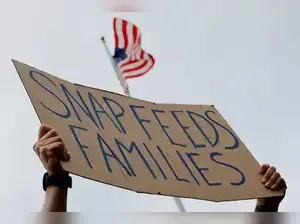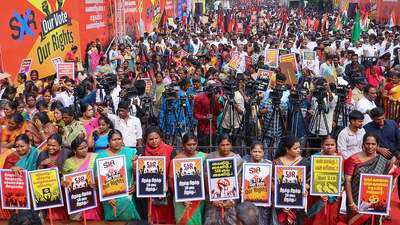SNAP food aid
The Trump administration has announced that all 42 million recipients of SNAP benefits (Supplemental Nutrition Assistance Program) will be required to reapply for their food assistance, citing widespread fraud in the program. The move, aimed at tightening oversight, comes amid criticism from hunger advocacy groups and legal challenges from multiple states.
SNAP is a federal US program that provides low-income individuals and families with funds to buy food through EBT cards. It helps ensure access to basic nutrition and reduces food insecurity. In 2024, SNAP had an annual budget of around $100 billion.
Why reapply? alleged fraud behind the move
The Department of Agriculture (USDA), led by Secretary Brooke Rollins, cited significant instances of fraud as the primary reason for the new policy. According to officials, 186,000 deceased individuals in 29 Republican-led states were found to have received payments, alongside more than 500,000 cases of duplicate benefits. These findings stem from an audit initiated in May 2015, which also uncovered arrests for illegal transactions and requests for sensitive data such as Social Security numbers from participating states.
Despite these claims, advocates argue that the alleged fraud is minimal. The Food Research & Action Center highlights that less than 1 percent of SNAP’s $100 billion annual budget is affected by fraud, and the average benefit per person is only $6 per day. Critics say the reapplication requirement could disproportionately impact legitimate beneficiaries who rely on the program for basic nutrition.
How SNAP works
SNAP provides low-income Americans with EBT cards to purchase food and is a cornerstone of federal assistance programs. While the program serves the entire United States, maximum benefits are higher in Alaska, Hawaii, Guam, and the US Virgin Islands due to higher food costs.
The program has faced recent budget scrutiny, including the July 2025 One Big Beautiful Bill, which reduced payments by $186 billion, and disruptions caused by a recent government shutdown, intensifying calls to improve efficiency.
When will the reapplication take effect?
Details of the reapplication timeline remain limited, but officials indicate it will be part of a “comprehensive reform” set to roll out in the coming weeks. Implementation could begin in late 2025 or early 2026, with cooperative states likely affected first. Unlike routine recertification, which occurs every six to twelve months, this will be a one-time, large-scale reapplication for all recipients.
Because SNAP is administered at the state level, rollout could vary widely. Some states may conduct expedited verifications. The majority of the states and multiple hunger advocacy organizations have already signaled legal opposition, which could affect the timeline and execution.
Beyond administrative hurdles, the request for extensive personal information, including Social Security numbers and addresses, has raised concerns about privacy and potential identity theft. Experts note that many errors in SNAP enrollment are unintentional, often stemming from income fluctuations rather than deliberate fraud.
SNAP is a federal US program that provides low-income individuals and families with funds to buy food through EBT cards. It helps ensure access to basic nutrition and reduces food insecurity. In 2024, SNAP had an annual budget of around $100 billion.
Why reapply? alleged fraud behind the move
The Department of Agriculture (USDA), led by Secretary Brooke Rollins, cited significant instances of fraud as the primary reason for the new policy. According to officials, 186,000 deceased individuals in 29 Republican-led states were found to have received payments, alongside more than 500,000 cases of duplicate benefits. These findings stem from an audit initiated in May 2015, which also uncovered arrests for illegal transactions and requests for sensitive data such as Social Security numbers from participating states.
Despite these claims, advocates argue that the alleged fraud is minimal. The Food Research & Action Center highlights that less than 1 percent of SNAP’s $100 billion annual budget is affected by fraud, and the average benefit per person is only $6 per day. Critics say the reapplication requirement could disproportionately impact legitimate beneficiaries who rely on the program for basic nutrition.
How SNAP works
SNAP provides low-income Americans with EBT cards to purchase food and is a cornerstone of federal assistance programs. While the program serves the entire United States, maximum benefits are higher in Alaska, Hawaii, Guam, and the US Virgin Islands due to higher food costs.
The program has faced recent budget scrutiny, including the July 2025 One Big Beautiful Bill, which reduced payments by $186 billion, and disruptions caused by a recent government shutdown, intensifying calls to improve efficiency.
When will the reapplication take effect?
Details of the reapplication timeline remain limited, but officials indicate it will be part of a “comprehensive reform” set to roll out in the coming weeks. Implementation could begin in late 2025 or early 2026, with cooperative states likely affected first. Unlike routine recertification, which occurs every six to twelve months, this will be a one-time, large-scale reapplication for all recipients.
Because SNAP is administered at the state level, rollout could vary widely. Some states may conduct expedited verifications. The majority of the states and multiple hunger advocacy organizations have already signaled legal opposition, which could affect the timeline and execution.
Beyond administrative hurdles, the request for extensive personal information, including Social Security numbers and addresses, has raised concerns about privacy and potential identity theft. Experts note that many errors in SNAP enrollment are unintentional, often stemming from income fluctuations rather than deliberate fraud.





